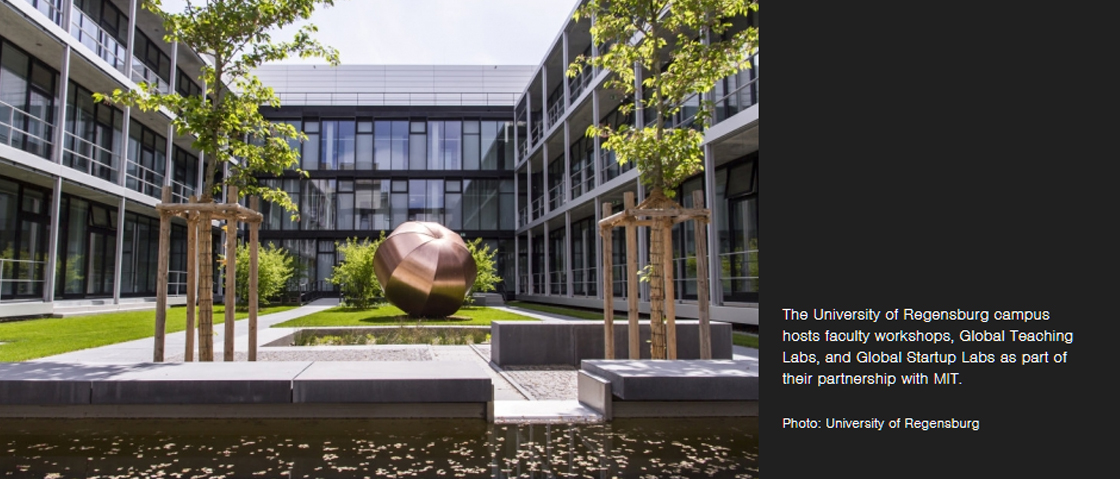A new agreement includes student programming, workshops, seed funds, and another five years of growing collaboration.
“MISTI brought me beyond the tourism level of being in Germany,” says MIT junior Tatsuya Daniel. “Through my Global Teaching Labs experience with the University of Regensburg, I was able to be directly immersed in the German education style.” Daniel is a student in the MIT-Germany Program and is one of many to benefit from the growing partnership between the program and the University of Regensburg (UR). MIT International Science and Technology Initiatives (MISTI) creates relationships with universities and other organizations around the world, providing students and faculty with opportunities to broaden their research and education. UR was the first university to create an official collaboration with MIT-Germany, helping the program create a model that has now been adopted by other German university partners.
The original agreement was built on a solid foundation of student experiences, and the renewal continues and expands UR’s unique versions of MISTI’s Global Teaching Labs (GTL) and Global Startup Labs (GSL), as well as opportunities for research.
“The renewal of the partnership with the University of Regensburg is an exciting milestone for the MIT-Germany Program,” says faculty director Markus Buehler. “It will allow MIT students to gain valuable teaching and research experiences and participate in cutting edge research. For example, one of our students has joined their theoretical physics department this summer to work on conducting lattice quantum chromodynamics calculations of hadronic observables. We anticipate that many other MIT students will have the opportunity to live, learn, and work in Bavaria through this partnership.”
GTL has proven to be one of the most popular pieces of the collaboration, giving MIT students the opportunity to learn through teaching. GTL challenges MIT students to synthesize and present what they know, work in a team, and communicate with peers of a different cultural background, all while sharing MIT's unique approach to science and engineering education with high school students around the world.
Daniel speaks highly of his experience as a GTL instructor from both an educational and cultural perspective. “By working with UR professors and students, we were able to identify differences in how students are taught in the U.S. and Germany. This helped our preparation by ensuring that we were able to clarify any points of confusion among the high school students.”
Regensburg’s Entrepreneurship Boot Camp is modeled after MISTI’s successful GSL programs. A small team of MIT graduate and undergraduate students work with UR Professor Christian Wolff to create and deliver a six-week entrepreneurship seminar for students in the UR Media Informatics MSc program.
“This was a wonderful experience for me,” said MIT doctoral candidate Madhav Kumar, who visited UR as a GSL instructor last summer. “Teaching entrepreneurship to students with advanced technical degrees was both challenging and extremely enriching. Our one-on-one brainstorming sessions with UR student groups helped us learn each other’s perspectives much better in this shared entrepreneurial journey."
UR students benefit from participating in the intensive curriculum that ranges from direct exercises to guest speakers “I learned a lot in the GSL,” said UR participant Andrea Fischer. “We not only learned about business, we also trained to speak in front of people and give presentations. And the guest speakers were great — entrepreneurs talking not only about their success, but about their failures as well.”
Another unique feature of the UR partnership is the development of short annual workshops or roundtables on a variety of topics, held at MIT and UR alternately. Past workshops have addressed the latest pedagogical techniques in STEM to select groups of faculty and students. This cultural exchange has proven valuable so far, as participants are able to compare and contrast their experience and best practices.
"We were very surprised to see how diverse and with which original methodical approaches university teaching is done at MIT,” said 2017 workshop attendee Oliver Tempner, professor of chemistry didactics. “I hope that more and more university teachers in Germany will take these student-centered learning approaches into account in their seminars."
This commitment to a student-focused educational experience was also highlighted by participant Arne Dittmer, professor of biology didactics. "I was very impressed by all the activities to improve academic teaching. All the people we met were highly motivated to enhance the culture of teaching and learning at MIT."
New workshop topics are selected each year, and the next session may focus on Regensburg’s deep expertise in physics research. This expansion and strengthening of faculty programs was a critical goal of the renewal.
Another exciting faculty-facing component of the new agreement is the integration of the University of Regensburg/MIT-Germany partnership into the MISTI Global Seed Fund (GSF) program. The inaugural year will provide one award to support the international exchange of faculty and students to jump-start new collaborative projects. The 2019-20 GSF call for proposals is now open for this and the rest of the MISTI funds.
“The creation of a dedicated seed fund is an exciting new piece of our partnership,” says Justin Leahey, MIT-Germany program manager. “It will be a great complement to our workshops and will further strengthen MIT’s ties with the University of Regensburg.”
MIT International Science and Technology Initiatives (MISTI) creates experiential learning opportunities across the globe for MIT students that increase their ability to understand and address real-world problems. MISTI’s Global Seed Funds grant program promotes collaboration between MIT faculty members and their counterparts abroad. A nucleus of international activity at MIT, MISTI is made possible through partnerships with corporations, governments, universities, foundations, and individuals. MISTI is located in the Center for International Studies within the School of Humanities, Arts, and Social Sciences.



